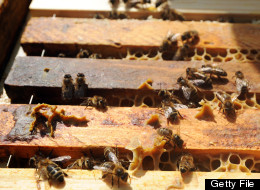Honeybee deaths are on the rise across the world, and researchers are working to find the cause. With as many as 40 or 50 percent of commercial U.S. bee hives lost to colony collapse disorder, according to the New York Times, scientists are eyeing a relatively new class of pesticides as a likely culprit.
Neonicotinoids, which are chemically similar to nicotine, have already been shown to interfere with bees' capacity to learn scents, hampering their efforts to collect food.
Colony collapse disorder -- which follows a "sudden loss of a colony’s worker bee population," according to the Environmental Protection Agency -- may be relatively new. It first surfaced around 2005, the New York Times explains, but has gotten dramatically worse in the past year.
The European Commission has been pushing for a neonicotinoid pesticide ban in the EU, but chemical companies have been protesting. Syngenta and Bayer, two of the top producers of the pesticides, recently proposed a plan to expand bee habitats and increase monitoring in an attempt avoid restrictions on their products.
In the U.S., a group of environmentalists and beekeepers recently filed suit against the EPA for approving the pesticides. Neonicotinoids, they wrote in the lawsuit, have been "repeatedly identified as highly toxic to honeybees, clear causes of major bee kills and significant contributors to the devastating ongoing mortality of bees known as colony collapse disorder,” reported Bloomberg.
The U.S. Department of Agriculture is expected to issue its own assessment later in the spring, according to the New York Times.
A recent study published by the American Bird Conservancy found that the pesticides may also negatively impact birds and water-borne insects. Mother Jones notes the report hasn't been peer-reviewed, but was authored by a retired senior research scientist formerly with Canada's environment ministry.
Original Article
Source: huffingtonpost.com
Author: James Gerken
Neonicotinoids, which are chemically similar to nicotine, have already been shown to interfere with bees' capacity to learn scents, hampering their efforts to collect food.
Colony collapse disorder -- which follows a "sudden loss of a colony’s worker bee population," according to the Environmental Protection Agency -- may be relatively new. It first surfaced around 2005, the New York Times explains, but has gotten dramatically worse in the past year.
The European Commission has been pushing for a neonicotinoid pesticide ban in the EU, but chemical companies have been protesting. Syngenta and Bayer, two of the top producers of the pesticides, recently proposed a plan to expand bee habitats and increase monitoring in an attempt avoid restrictions on their products.
In the U.S., a group of environmentalists and beekeepers recently filed suit against the EPA for approving the pesticides. Neonicotinoids, they wrote in the lawsuit, have been "repeatedly identified as highly toxic to honeybees, clear causes of major bee kills and significant contributors to the devastating ongoing mortality of bees known as colony collapse disorder,” reported Bloomberg.
The U.S. Department of Agriculture is expected to issue its own assessment later in the spring, according to the New York Times.
A recent study published by the American Bird Conservancy found that the pesticides may also negatively impact birds and water-borne insects. Mother Jones notes the report hasn't been peer-reviewed, but was authored by a retired senior research scientist formerly with Canada's environment ministry.
Original Article
Source: huffingtonpost.com
Author: James Gerken

No comments:
Post a Comment